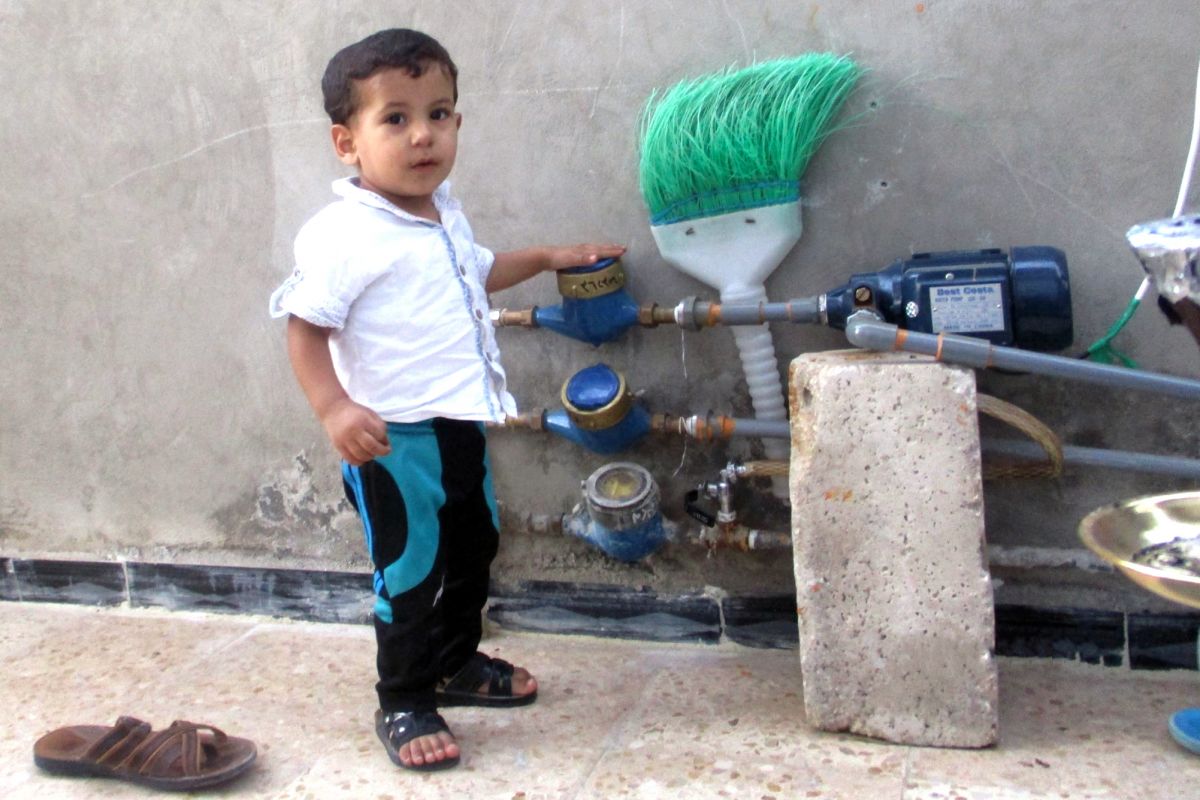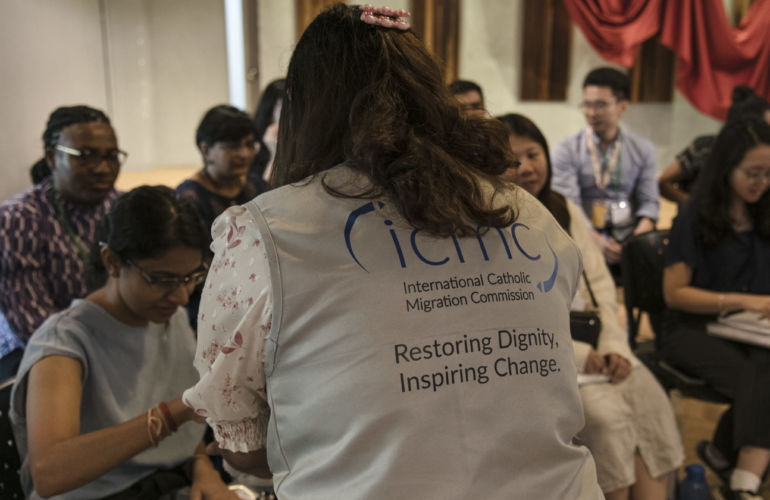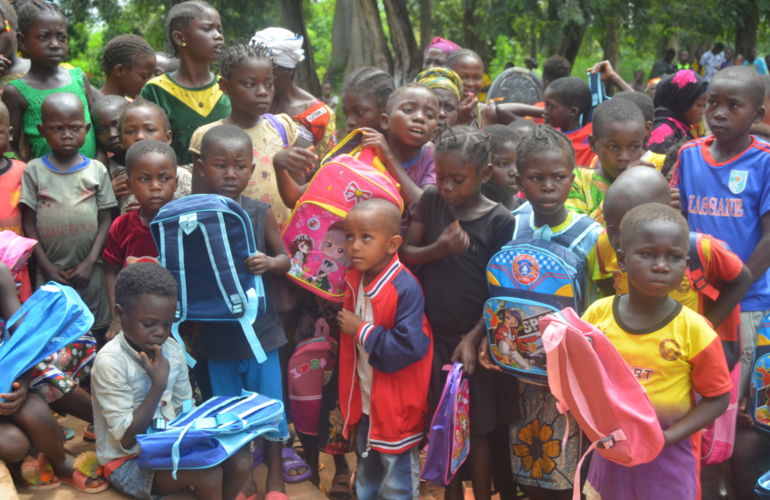New Research by ICMC Jordan Maps the Impact of COVID-19 on Household Violence Against Children
Community-based research recommends future actions based on the experiences of refugee and Jordanian parents and children.

As the global response to COVID-19 continues, so does the ongoing impact of the pandemic on the lives of people with vulnerabilities. For the 660,000 Syrian refugees living in Jordan, COVID-19 lockdowns have created stress and exacerbated household tensions for families, including children.
“Every member of each family was impacted,” says Rami Alkhalil, a psychosocial counselor working at the International Catholic Migration Commission (ICMC)’s Protection Centers in Irbid and Mafraq. “As schools closed, children lost the opportunity to learn and socialize with their friends. With businesses closing, fathers and husbands could no longer earn a living for their families. Mothers and wives lost the personal space they used to have during the day and had to cope with the new burdens of following their children’s online education.” These additional responsibilities are an especially heavy burden for mothers who have not completed their schooling or whose families lack access to a stable internet connection or electronic devices.
The International Catholic Migration Commission (ICMC) Jordan provides vital humanitarian assistance to vulnerable and at-risk individuals in both refugee and host communities. ICMC field teams in Irbid and Mafraq identified domestic violence against children as a major area of concern in need of further investigation. ICMC Jordan’s new research report “Violence Against Children in the Household: Protection Monitoring Report 2020-21” aims to address the gap in data available on this issue at the national level and to ensure that the voices of affected populations are central to its recommendations for future action by NGOs and State authorities.
The report provides the perspectives of parents, caregivers, children, and service providers on the issue of household violence against children. Participants shared their own experiences; these are reflected in the report’s focus on the impact of violence. The report sheds light on how gender and nationality affect participants’ perception of violence, and how parents, children, and other adults often attempt to justify household violence. It also provides information on crime reporting practices.
Parents pointed to household tensions caused by school closures during lockdowns as a cause of increased violence, as family members spent more time together in the home. Online education and the closure of extracurricular activities also meant that children no longer had opportunities to meet with their peers outside the home and use up energy. “The problem is also that we don’t even feel safe to allow the children to play outside,” said another Syrian refugee father. “All this generates pressure and tension, which might lead to violence.”
Syrian refugees in Jordan have been particularly affected by the economic impacts of COVID-19. Ninety percent of ICMC program participants report being in debt, more than half are unable to pay rent, and growing numbers are under threat of eviction. According to the report’s findings, some parents consider socioeconomic pressures to be another cause of violence. “I raised my children saying that I will meet their needs, but now I don’t have money,” says one Syrian father. “We have no work, no source of income, and the last thing we need is the children disturbing and annoying us.”
ICMC’s research also revealed a diverse range of views among parents on the topic of violence against children in the household. Many parents consider physical punishment to be an acceptable way of disciplining children. While fathers were most often mentioned as the main perpetrators, other family members are also involved. “Of course, an uncle or grandfather could hit the children,” said one Syrian father. “If the grandfather has to beat the child, it’s for [the child’s] own sake.” While some respondents invoke the additional financial and social pressures faced by Syrian refugees as the cause of increased incidents of violence against children, others consider that nationality is irrelevant. “I think violence is an attribute of a person, no matter his nationality,” reflected one Syrian father.
In order to prevent violence and to support parents in their educational role, ICMC Jordan offers Positive Parenting courses to encourage parents and caregivers to adopt effective, non-violent discipline strategies with their children. ICMC also provides psychosocial and mental health support and leadership training to empower men and boys to act as gender equality advocates. ICMC’s Local Community Groups ensure that participant communities are well-equipped to identify and respond to key protection concerns, including by challenging family-based violence against children in their communities and reporting incidents to the relevant authorities.
ICMC Jordan’s Child Friendly Spaces offer learning and recreational activities for children aged 3 to 15. The Spaces’ curricula focus on life skills, child rights, body awareness, and non-violent behavior. ICMC social workers are trained to identify signs of abuse and carry out appropriate actions to support children. When necessary, participants may be referred to ICMC’s counselling services
ICMC Jordan’s Protection Centers programs also include Youth Empowerment Peer Groups aimed at enhancing the resilience of 15 to 24 year-olds by building up their self-esteem and confidence. Youths are encouraged to discuss issues affecting their communities and capitalize on their skills to launch their own social initiatives. Additionally, the Protection Centers’ Intergenerational Groups bring together youths and older individuals, encouraging dialogue across generations and promoting understanding and tolerance. Over 6,000 children benefited from these activities in the last year.
In 2020, ICMC Jordan assisted over 17,000 vulnerable individuals through its Protection, Education, Livelihoods and Humanitarian Assistance program. Under its Cash for Rent Assistance program, ICMC helped 350 vulnerable households to secure and maintain a safe shelter. ICMC provided support to over 820 families to help them cope with expenses related to winter and the winterization of their homes. Over 480 households received emergency cash assistance through ICMC Jordan’s ongoing programs, and 917 households received special COVID-19 cash assistance. Families reported that the assistance reduced their household’s financial burden and decreased their financial stress.
The report uses the thoughts, experiences, and reflections of refugee and Jordanian children, parents, and service providers to set out a series of recommendations to help humanitarian actors, international donors, and the Government of Jordan create informed policies and intervention plans to end domestic violence against children.



